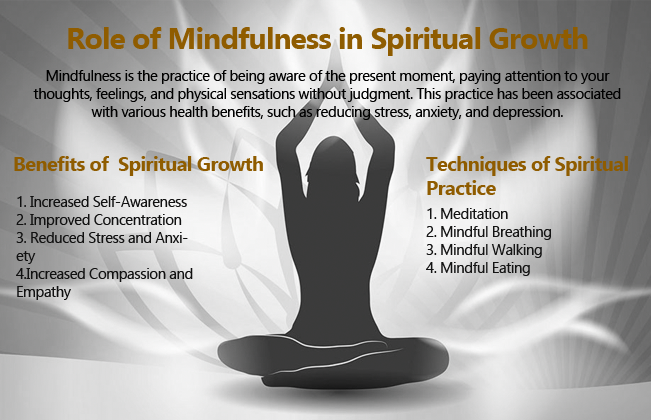Introduction: Mindfulness is the practice of being aware of the present moment, paying attention to your thoughts, feelings, and physical sensations without judgment. This practice has been associated with various health benefits, such as reducing stress, anxiety, and depression. However, mindfulness is not just a tool for improving mental and physical health. It can also be a powerful tool for spiritual growth. In this article, we will explore the role of mindfulness in spiritual growth, including its benefits and techniques for incorporating mindfulness into your spiritual practice.
The Benefits of Mindfulness for Spiritual Growth: Spiritual growth is the process of becoming more aware of yourself, your connection to others, and your connection to the universe. Mindfulness can help you in this process by providing a way to become more present and aware of your thoughts, emotions, and physical sensations. Here are some of the benefits of mindfulness for spiritual growth:
- Increased Self-Awareness: Mindfulness helps you become more aware of your thoughts, emotions, and physical sensations. By paying attention to these experiences without judgment, you can develop a deeper understanding of yourself and your inner world. This self-awareness can help you identify patterns of thought and behavior that may be holding you back from spiritual growth.
- Improved Concentration: Mindfulness involves focusing your attention on the present moment. This practice can help improve your concentration and focus, which is essential for spiritual growth. By learning to focus your mind, you can develop the ability to stay present and engaged during your spiritual practice.
- Reduced Stress and Anxiety: Mindfulness has been shown to reduce stress and anxiety levels. When you are less stressed and anxious, you are more open to spiritual growth. You are also better able to connect with others and the universe around you.
- Increased Compassion and Empathy: Mindfulness can help you develop compassion and empathy towards others. By learning to pay attention to your own thoughts and emotions, you can better understand the experiences of others. This understanding can help you connect with others on a deeper level, which is important for spiritual growth.
Techniques for Incorporating Mindfulness into Your Spiritual Practice: Here are some techniques for incorporating mindfulness into your spiritual practice-
- Meditation: Meditation is a powerful tool for developing mindfulness. During meditation, you focus your attention on your breath or a specific object, such as a candle or a mantra. When your mind wanders, you gently bring it back to the present moment. Over time, meditation can help you develop a more focused and calm mind, which is essential for spiritual growth.
- Mindful Breathing: Mindful breathing is a simple but effective technique for developing mindfulness. Sit comfortably and focus your attention on your breath. Notice the sensation of the air moving in and out of your body. When your mind wanders, gently bring it back to your breath. This technique can be practiced anywhere, at any time.
- Mindful Walking: Mindful walking involves paying attention to the sensation of your feet touching the ground as you walk. Focus your attention on the physical sensations of walking, such as the movement of your legs and the feeling of the ground beneath your feet. This technique can help you become more present and aware of your body, which is important for spiritual growth.
- Mindful Eating: Mindful eating involves paying attention to the sensations of eating, such as the taste, texture, and smell of your food. Eat slowly and savor each bite. Notice how your body feels as you eat. This technique can help you develop a deeper appreciation for the food you eat and the nourishment it provides.
Conclusion: Mindfulness is a powerful tool for spiritual growth. By becoming more present and aware of your thoughts, emotions, and physical sensations, you can develop a deeper understanding of yourself
![]()





